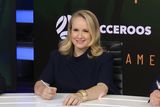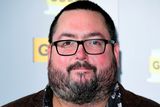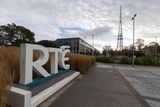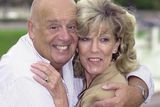‘It was designed to be in the same space as The Late Late Show’ – The former TV3 exec who’s the most powerful woman in Australian television
Beverley McGarvey on Eamon Dunphy’s chatshow, RTE’s travails and becoming the news



More than 20 years ago, the most powerful woman in the Australian TV industry was just a young executive at TV3 with a big task on her hands.
It was the summer of 2003 and Beverley McGarvey was the head of promotions at TV3, Ireland’s first commercial channel now known as Virgin Media One, and was responsible for producing a compelling promo for The Dunphy Show.
Fronted by larger-than-life broadcaster and pundit, Eamon Dunphy, it was a direct attack on RTÉ’s The Late Late Show. For McGarvey, the pressure was on.
“The Dunphy Show was designed to be in the same space as The Late Late Show, designed to cause a big splash – and this promo had to reflect that,” she recalls.
Bandying round ideas that didn’t quite hit, McGarvey’s team chose to pair Dunphy with an equally outrageous and well-known personality, and watch sparks fly.
“It needed to bring the audience in, so we had Michael O’Leary driving a cab with Eamon in it, getting him to the studio,” McGarvey remembers. “It was meant to be funny, and it was funny.” In the clip, the pair bicker and snarl on the way to The Helix arts centre on the Dublin City University main campus, where the chat show was filmed.
With O’Leary behind the wheel, commentators identified a nod to the airline boss’s purchase of a taxi licence at the time, allowing his chauffeur to beat traffic in Dublin’s bus lanes. Meanwhile Dunphy, in the back seat, appeared to poke fun at his then driving ban. The ad was well-received – unlike the subsequent chat show which famously struggled in the ratings before it was axed by TV3.
Dunphy and O’Leary must have been quite the formidable duo to manage, I remark.
Beverley McGarvey at Channel Ten Studios in Sydney. Photo: Getty
“Well, I didn’t direct the promo,” McGarvey admits. “I was in charge, then somebody else directed it, but we’d made The Weakest Link with Eamon before, and he was really good at that and great to work with. It all went smoothly from memory,” she says.
It’s morning in Sydney and McGarvey sits at a desk in an unfeasibly expansive office. Behind her are a trio of towering windows, pink velvet couches and armchairs, elegant tall plants and a large TV screen fixed to the wall. The scene is so polished that I compliment her on what I assume is a virtual background.
“No, this is my office,” she laughs.
Read more
It’s weeks before Christmas and the Belfast-born executive (51) has presided over a series of upfront events revealing new programmes to major advertisers for Network Ten and the streaming service Paramount+.
At Network Ten’s Pyrmont Studios in October, around the corner from the Sydney Harbour Bridge, Australian television personalities Julia Morris, Beau Ryan and Robert Irwin – son of late crocodile hunter Steve – showcased local versions of I’m a Celebrity Get Me Out of Here, Deal or No Deal and a revival of the 1990s teatime favourite, Gladiators.
In images from the event, they pose and smile while orbiting boss McGarvey, who is executive vice president and chief content officer at Paramount ANZ, the company which owns Network Ten, one of a handful of free-to-air television networks in Australia. (Notable Network Ten shows airing on Irish screens over the years range from Offspring, Five Bedrooms, The Secret Life of Us and Neighbours.)
McGarvey is currently the only woman to lead an Australian TV network – though shares the post with chief operating and commercial officer Jarrod Villani – and today, is mostly preoccupied with the Wheel of Fortune reboot hosted by one of Cork’s favourite sons, Graham Norton.
“We’re shooting it today,” she tells me. “ITV is making the UK version in the UK and through a partnership, we had the opportunity to shoot six episodes with Australian contestants,” she says.
Beverley McGarvey worked on the launch of TV3
McGarvey spots my confusion.
“There are quite a few Aussies in the UK already, so we’re shooting with Aussie contestants and an Aussie audience. I don’t think we’d be fortunate enough to get Graham to come over here.
“In this environment when we’re economically challenged, trying to find efficient ways to do things is increasingly more important.”
For McGarvey, survival and success hinge on economics.
“In order to compete in prime time, you need a programme with broad appeal and a higher volume of episodes,” she says. “When we commissioned MasterChef [based on the British cooking show] we were making 80 episodes a season at one point and the UK series had 10 episodes. There was incredible value in making that many episodes, playing them multiple nights a week.
“[Networks] Seven and Nine have their sporting content so we’ve always had to be feistier and punch heavier from 7.30pm with shows like Survivor and MasterChef.”
Both programmes pulled in significant audience share increase last year, with the former reality series cracking the top five and the MasterChef finale breaching the top six in overnight ratings.
“But you never sit comfortably,” says McGarvey. “Audience habits are changing and it’s a tough environment with three big commercial players here and [national broadcaster] ABC having a significant audience,” she says.
It’s a battlefield, I suggest. She nods. “Australia is a really competitive country.”
The TV boss was raised in Carnmoney on the outskirts of Belfast during the Troubles and despite growing up in a climate of sectarian violence, enjoyed an ordinary upbringing.
“I grew up 10 miles away from Belfast, where there were lots of security. I went to school in Belfast with soldiers out on the street, but you didn’t notice because it was normal to you.
“You only noticed when they were gone after the ceasefire. In my late teens, suddenly it all went away, it was great. If you went into a shop before the ceasefire, it was like being at the airport, you had to put your bags through a scanner,” she recalls.
Her late mother stayed at home with Beverley and younger brother Paul, while their father was an upholsterer. She attended the Belfast Royal Academy, which typically encouraged careers in law and medicine, but the young student had other ideas.
“I watched a lot of TV – Grange Hill, Neighbours. My parents would see me watching TV and say, ‘Do your homework. That’s not going to be a career.’”
Studying media at the University of Ulster in Coleraine, she landed an internship and then her first job in the UTV newsroom in Belfast.
“I worked on Counterpoint, the current affairs show, I did shifts on the Kelly [talk] show. I was working on everything.
“It was a small newsroom but often what we worked on was world news – the Omagh bombing, the Clinton visit, Hillary Clinton on the Ormeau Road. The team was very accomplished and there was an efficiency to everything,” she says.
By 1998, McGarvey was living in Dublin and working on the launch of TV3.
“There was just 20 of us on the team, working up to the big day. But then the shock was, once we launched, we realised we had to do it every day,” she recalls.
Six years later, the self-described “bolshie, yet meek 20-something” was itching to climb the ladder after simultaneously leading the promotions and scheduling departments at TV3. She wanted to be the head of programming and while that role was already taken in Dublin, her boss at the time had connections further afield.
“He said, ‘I might know of a director of programming job, but there’s a catch – it’s in New Zealand.”
Although concerned by the distance, she knew it was too good a chance to turn down. “I thought, if it doesn’t work out, nobody will know and I can just come home.”
‘If you get an offer at a network in Sydney, you take it’
Then, after two years as director of programming in Auckland with New Zealand channel TV3, also owned by TV3 Ireland’s umbrella company, CanWest, an offer came from Sydney – head of programming at Network Ten.
“It was probably too soon to leave New Zealand but if you get an offer at a network in Sydney, you take it, because they don’t come up very often,” she says.
By 2012, she was chief programming and chief content officer at Network Ten before the 2020 purchase by ViacomCBS saw McGarvey named executive vice president of the network.
“I was afraid of leaving Dublin, but taking that risk led me to opportunities that I’ve been lucky enough to have ever since,” she says.
In October 2023, Mediaweek, the online trade website serving the Australian media industry, announced the annual 100 power list of Australia’s top media executives. She came in seventh place, the highest-ranking woman, behind six men. She was also one of only seven women in the top 25.
I remind McGarvey – who shares daughter Scarlett (9) and son Cathal (8) with husband Ben, an entertainment lawyer – of a 2012 interview where she said, “when I first got to Australia, it was probably more male than other [TV] markets I’ve worked in, but I think that’s probably changing.”
I now ask whether it has changed.
“Not changing as quickly as it should,” she admits. “When you look around, when you google all the executives’ names in Australia compared to the UK and the US and other markets, we’re not there yet.”
Since ascending the ranks, McGarvey’s policies, even her name, have been analysed intently in the Australian press.
“The level of scrutiny of media executives here, it’s unusual,” she says. “In other markets, trade media might be interested in you, but here, mainstream press want to talk to you too.”
In July 2022, a headline in a well-known news site personally targeted the executive over the low ratings of a new failing breakfast show format, among other issues: ‘Pressure mounts on Channel 10 boss Beverley McGarvey to step aside amid massive ratings shocker.’ Meanwhile co-chief Jarrod Villani wasn’t mentioned in the article.
Months later, McGarvey was criticised for a divisive stance in the January 26 debate. Traditionally marked as Australia Day, a public holiday commemorating the landing of the first fleet of British colonists, there’s been growing pushback in respect of Indigenous Australians, many of whom refer to it as a Day of Mourning. Network Ten became the first channel to move against Australia Day, allowing staff to work the public holiday if they chose.
In response, the outcry against the network’s approach was intense and McGarvey was directly targeted in headlines.
“We didn’t consider it to be brave or risky,” she says of the decision. “It was a choice for our staff. Every individual has a different opinion. Seven and Nine didn’t do it but we have strong policy around diversity and inclusion.”
I wonder if there’s any lasting impact of the personal attacks by the Australian media against her, something her male counterparts, Seven Network boss James Warburton, Nine Network CEO Mike Sneesby and even colleague Villani, appear to avoid.
“I do speak to our peers in other countries, and they find it quite surprising. I’d like it to stop, I don’t like it. It might be slightly a gender thing,” she concedes.
It’s months since former RTÉ director general Dee Forbes resigned after a scandal involving undisclosed payments to TV personality Ryan Tubridy – a controversy that engulfed the broadcaster. Was McGarvey across the story?
“Managing that sort of crisis, especially when it’s to do with high-profile talent, is always very difficult, nobody wins and it’s bad for everyone,” she diplomatically answers. “When I read about things happening like that, you always think, ‘Do you have your own house completely in order?’”
And just like that, McGarvey’s increasingly distracted stare indicates our time is wrapping up. Correspondence needs tending to, and a media empire requires her full attention.
Join the Irish Independent WhatsApp channel
Stay up to date with all the latest news













